I’ve put aside two hard-hitting essays regarding the ongoing assault on Whites in the United States because I suspect readers need a break from the relentless negative news we’ve all been exposed to. I confess I’m more than guilty of pointing out how rapidly the situation of Whites has become exceedingly bleak, I suffer from that situation in real life, and like readers, I need a break, too. So perhaps the current relative lull in The System’s assault on us will allow readers a chance to watch one, two or all three of the uplifting Hollywood films I’m going to recommend.
Thus, in this essay I will celebrate these three implicitly pro-White films that since 2016 have somehow survived the gauntlet of our modern commissars to emerge as honest, realistic stories of White men doing heroic deeds. No Numinous Negroes, no Wakanda, no “Jews to the Rescue.” Just White men like we really have been since time immemorial, placed now in modern technological settings that we White men have ourselves created. The three films are Deepwater Horizon, Sully (both 2016) and Only the Brave (2017).
* * *
Deepwater Horizon
Deepwater Horizon (2016) trailer
The disaster film Deepwater Horizon stars three A-List actors: Mark Wahlberg, Kurt Russell and John Malkovich. It tells the true story of a huge oil rig in the Gulf of Mexico that suffered a series of fatal explosions, resulting in a massive oil spill that made world headlines for weeks. Deepwater deals with hard men who work with their hands. They are the kind of men who keep America humming, putting gas in the tanks of the cars and trucks we drive, providing the backbone to the globe-girdling U.S. military, and keep toasty warm the homes of Americans in subzero locales such as Minnesota, Wisconsin and Michigan.
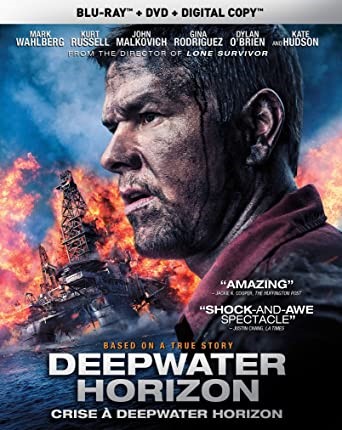
Mark Wahlberg plays the lead with grit and seriousness. He has a man’s job to do — and he does it.
Ditto for “Mr. Jimmy,” the rig manager played by an aging Kurt Russell. No cute jokes for either man or knowing winks at the audience. Instead, they are gruff, no-nonsense employees in the high-stakes world of oil drilling, where mammoth machines can chew up a man in an instant and hellish infernos can erupt from liquid gold far under the ocean. Deepwater Horizon captures these dangers in spades and blasts them out at you without mercy.
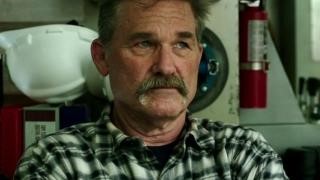
Kurt Russel as Mr. Jimmy
Not only is there non-stop suspense and action in this flick, there is also a depiction of the unyielding business pressures to get the job done no matter the cost or risks. Here we are treated to masterful dialog by the trio of engineer Wahlberg, rig manager Mr. Jimmy, and John Malkovich as Donald Vidrine, a senior British Petroleum supervisor.
I know little about the South, but it sounds as if Malkovich is using a Louisiana Creole accent, which I found fascinating. As Mr. Vidrine, he cloaks his no-nonsense demands in folksy sayings and metaphors, which Wahlberg and Russell take in stride. I’ve already listened to this dialog half a dozen times but could stand to listen to it a dozen more times. Experience the best part here.
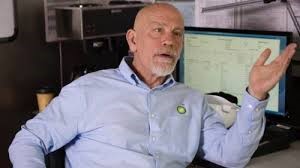
John Malkovic as Mr. Vidrine
Once you’ve enjoyed the theater skills of the voices and dialog, watch it all again for the attempt to give an inside view into the workings of one of the biggest corporations on earth. I don’t think any knowledgeable film buff could watch this scene without thinking of Ned Beatty’s amazing soliloquy about the world of money in the 1976 classic Network. Both speeches are pure magic.
The business considerations as cause of the disaster out of the way, we next enter into the fires, explosions, deaths & injuries, and heroics of the men on the doomed oil rig. Truly it is a glimpse of hell.
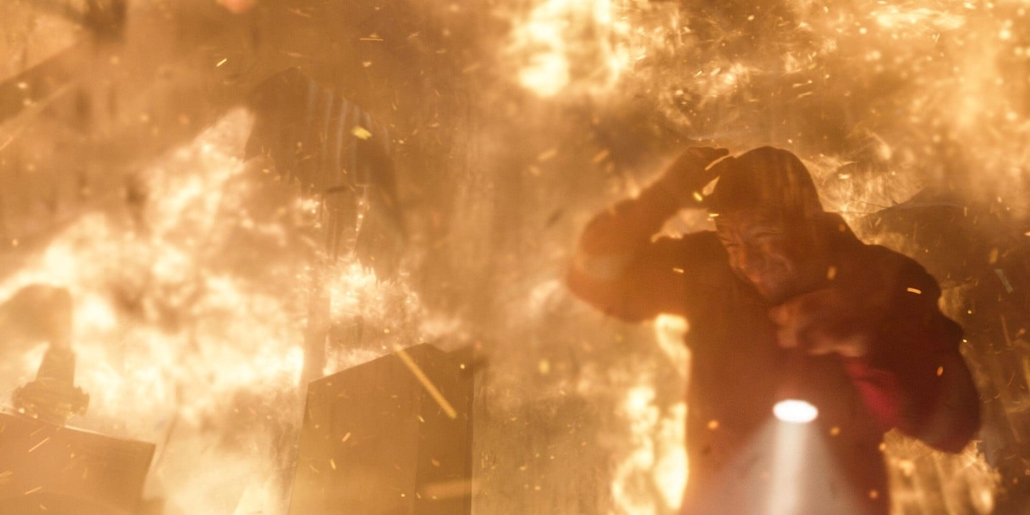
Some crewmen survive, some die, some are gravely injured. One man selflessly sacrifices his life to save fellow crewmen, the vast majority of whom are White — and male. An exception comes in the form of a subcontractor position played by Gina Rodriguez, a Puerto Rican American actress. She has one line where she clearly makes a better decision than her male boss, but when the fires rage hot, she breaks into an uncontrolled panic and is saved by a daring and level-headed White male (Wahlberg’s character).
As we will see later with Only the Brave, Deepwater honors the eleven men who lost their lives by showing their photos at the end of the film. The postscript reads: “The blowout lasted for 87 days, spilling an estimated 210 million gallons of oil into the Gulf of Mexico. It was the worst oil disaster in U.S. history.” The men lost in that disaster were not “deplorables,” “insurrectionists,” “right-wing terrorists” or “White supremacists.” They were White men like our fathers, brothers, classmates and neighbors. They equal the Real America. It is proper that they are honored in this film.
* * *
Sully
Sully (2016 – watch trailer)
The second film of my trio is the Clint Eastwood-directed Sully, the true story of Captain Chesley “Sully” Sullenberger, who glided a crippled airliner away from the towers of New York City and safely landed on the frigid waters of the Hudson River. What is so wonderful about the film is the fact that it is so true to real life, something Hollywood is not always known for.
Let me explain with this little experiment. Think about the last time you walked through an American airport, particularly one that is heavily domestic. Who were the pilots in uniform you saw strolling down the corridors pulling their leather flight bags?
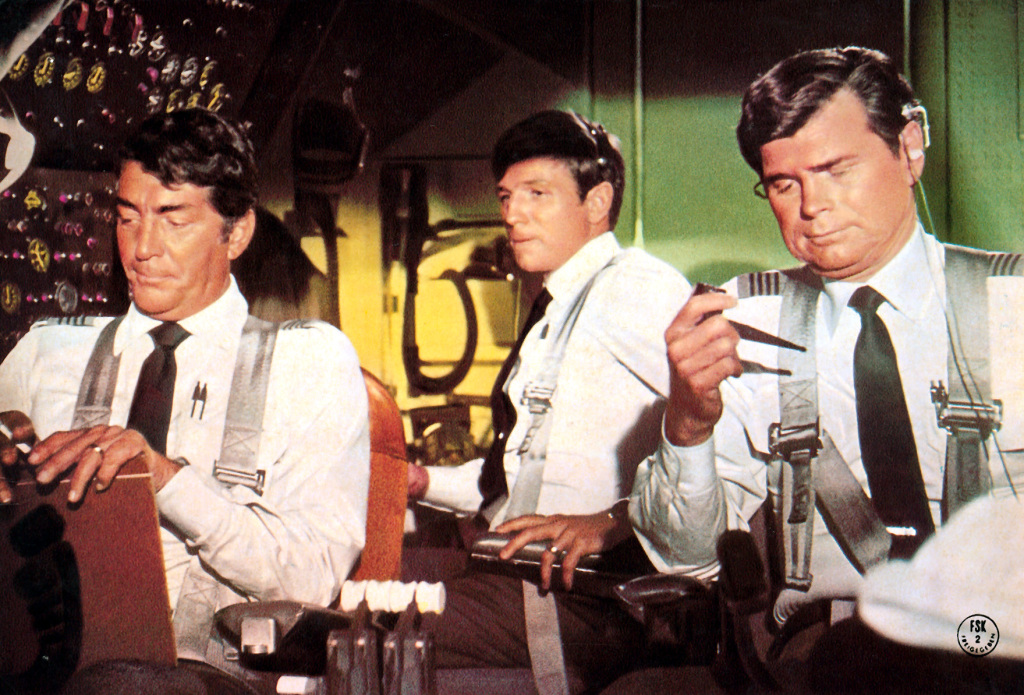 A Nice White Flight Crew — Airport (1970)
A Nice White Flight Crew — Airport (1970)
Admit it — you saw White males in uniform. That would make sense, since unlike most other professions today, piloting airplanes in America has remained in the vicinity of 95% White and male. This must gall liberals and social engineers, for these groups dream of a world of “equality,” that is, one in which White males are purged, punished, eliminated, or at least relegated to humiliating positions of impotence.
Sully came out in 2016 in the face of endless promotion of non-white diversity and “vibrancy,” going against all that Hillary Clinton and her vast entourage represented, and supported the reality that it is White males who built the public manifestations of Western civilization and to a large degree still keep it going.
Oh, how delicious it was to watch Tom Hanks as a competent, seasoned pilot, making the best decisions in only seconds.
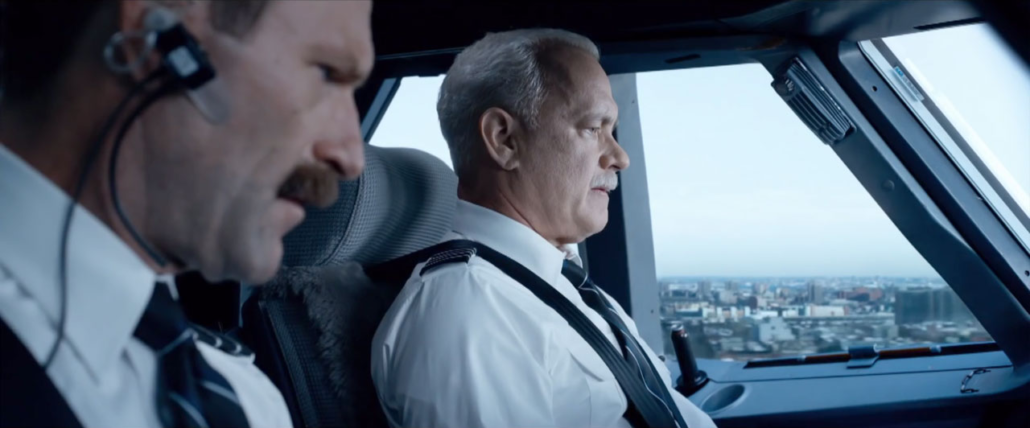
Next to Hanks sits the first officer, played by Aaron Eckhart, who is tall, square jawed and tough. Dare I say he’s almost Aryan?
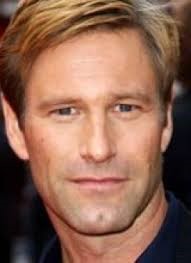
Hats off to Eastwood for casting Hanks and Eckhart as the cockpit crew of Sully. Further, most of the supporting cast is White as well. Real life, real celluloid representation. Sometimes, that’s all I can ask of Hollywood, a wish I don’t often have granted.
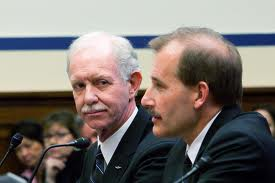
Actual Pilots “Sully” Sullenberger and Jeffrey B. Skiles
Because of its unvarnished heroism, I’m going to give a somewhat detailed description of the action in Sully. It was frigid in New York on January 15, 2009. “Sully” Sullenberger sat in the left-side seat, while first officer Jeffrey B. Skiles sat to his right. Skiles was slated to fly this leg of the journey, and the plane lifted off uneventfully, turning northwest. As it neared 3,000 feet, the A320 struck a flock of large Canada geese, some of which were ingested into the two engines. The collision resulted in a full loss of power. Coming at such a low altitude over a major city filled with skyscrapers, the situation was critical.
To provide backup power, Sullenberger switched on the tail-mounted APU, a generator which provides auxiliary power. The pilots had only seconds to decide whether to return to LaGuardia, try to reach Teterboro Airport on the New Jersey side of the Hudson River, or find some alternative. Drawing on his vast experience, Sullenberger determined that trying to reach either airport was a poor choice, so he opted to land on the calm winter waters of the Hudson. Passing less than 900 feet over the George Washington Bridge, the plane landed safely in the middle of the Hudson, where all passengers and crew were rescued by nearby boats.
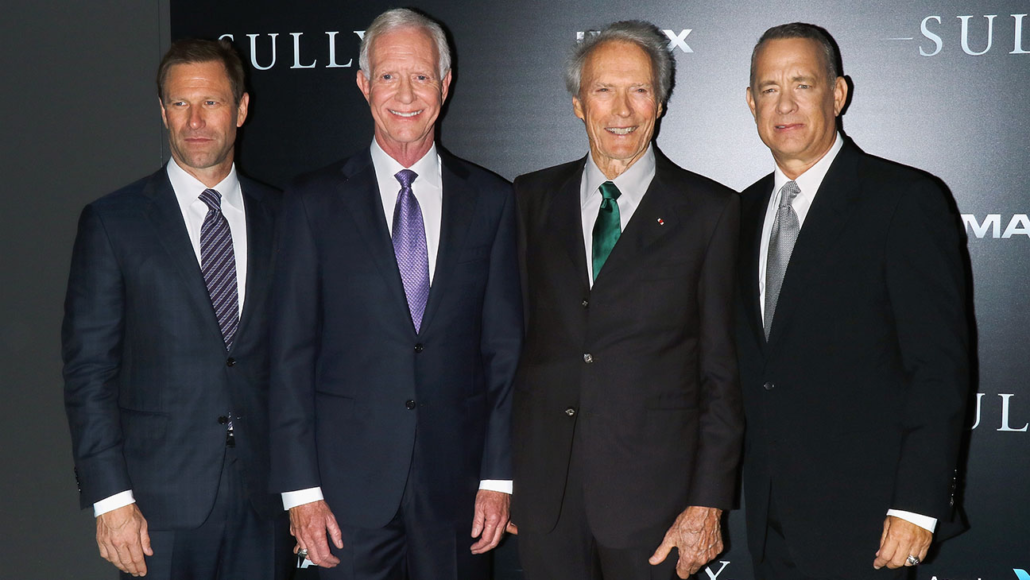
Eckhart, Capt. Sullenberger, Eastwood and Hanks
Enjoy looking at the faces of White men like this while you still can. Unlike so, so many other “reenactment” and “based on” films and documentaries, Eastwood’s Sully panders not at all to liberal pieties, not even in minor roles such as air traffic controller or captain of a ferry boat. We don’t have the cheesy cabin ensemble of multiracial passengers, something ushered in by the likes of Airport 75 and other such dreck from the seventies. Sully is like the cast of The Waltons, imagined as if John-Boy had grown up and become a pilot like Sullenberger. No drinking, no drugs, no wild sex. Just traditional White Americans living their lives and dealing with the challenges life inevitably throws their way.
Surprisingly, despite its debut during the run-up to the Hillary-for-President season, the same press that so blatantly supported Hillary and savaged Trump as “literally the next Hitler” gave Sully overwhelmingly positive reviews. For instance, reviewer Simon Thompson awarded the film nine out of ten points, writing: “Sully is a beautifully balanced, classily nuanced and hugely engaging film that avoids all the clichéd pitfalls it could have slipped into. Tom Hanks gives one of the best performances of his career and Clint Eastwood’s direction is beautiful and rich. It’s not just a great movie, Sully is one of the best pieces of cinema that a major Hollywood studio has released this year.”
A reviewer at ebert.com wrote:
As Capt. Chesley “Sully” Sullenberger, the plain-spoken, cool-headed veteran pilot who pulled off the impossible under immense pressure, Tom Hanks once again reminds us why he continues to be Hollywood’s best personification of the all-American Everyman since James Stewart’s “Mr. Smith Goes to Washington.” Who else is so good at encapsulating such red-white-and-blue values as never-say-die commitment, pride in a job well done, doing your duty no matter the cost and selfless courage in the face of disaster without being a goody-goody bore?
Even the Village Voice said kind things about the film: “This is a talky, mild-mannered drama about stoic, middle-aged white men exhibiting poise amid chaos and illustrating the sanctity of simply doing one’s job.”
If you’d like more background on Sully, see my original 2017 review here.
* * *
Only the Brave
Only the Brave (2017) trailer
Only the Brave is another story about the lives of White men who get their hands dirty. Early on, we see a scene where a moderate forest fire is being handled by a hot and sweaty crew. Miraculously, there are no affirmative action minority hires in this scene, no tough Puerto Rican chick, no sensitive black guy. Just garden-variety White men — tough men. And the entire movie remains that way without exception. Even the men’s families are nice White people:
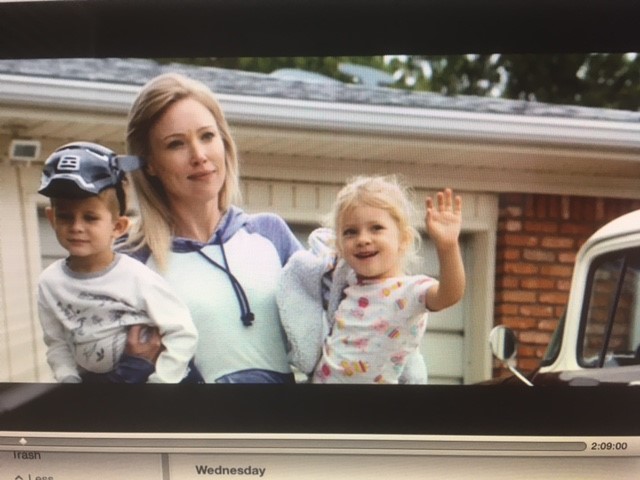
Like Deepwater Horizon and Sully, Only the Brave is based on a true story, the incredibly tragic demise of 19 out of 20 members of an elite firefighting crew called “Hot Shots.” On June 28, 2013, dry lightning ignited a fire near the hamlet of Yarnell, Arizona, just northwest of Phoenix. While the situations in the first two movies discussed above involved sudden accidents that unexpectedly overtook the White heroes, in Only the Brave, these firefighters knew they were always living on the cusp of danger, thus making these men the truest of heroes because they knowingly risked their lives to protect their fellow Americans.
The film is centered around crew chief Eric Marsh, played by a man’s man, Josh Brolin. At every turn, the film succeeds in portraying Marsh as a thoroughly admirable character who is a natural leader of men.
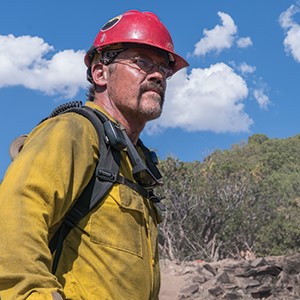
The film includes a number of softer scenes of Marsh with his wife, likely inserted to drawn some women to the film, but it is clear that Marsh’s life is out in the mountains facing fires that aim to kill him. I suppose that conflict with his wife provides some of the tension in the film, but the wife is grossly outclassed by Marsh’s masculinity and intense focus on his job. At one point, for instance, while the couple is sharing a candle-lit bath, the wife asks a taciturn Marsh, “Do ya wanna talk about it? Or do you wanna do your John Wayne thing?” Marsh remains silent.
Of course she already knew the answer. Immediately, the movie cuts back to the male action. How appropriate, though, that the wife referenced John Wayne, for this 2017 film and its characters belong back in the Wayne era when men were men and women were women. Right and wrong are clearly understood, and there is no hint whatsoever that these men’s world will soon be overtaken by foreign immigration, Black Lives Matter degenerates, or feminists running amok on the streets. America is still a White man’s country.
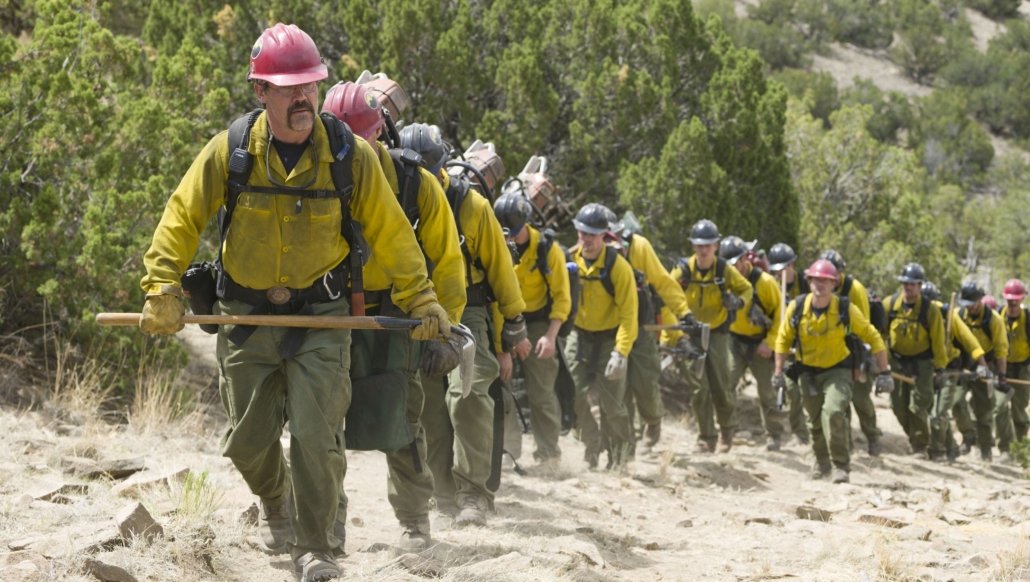
To be sure, these men are not cardboard characters lacking flaws. Indeed, they are human. Second to Marsh is Brendan, a young man who in the beginning of the movie is shown smoking meth, committing petty larceny, and getting one of his throw-away girlfriends pregnant. His struggle to grow into a mature man is a central theme of the movie, along with Marsh’s decision to take Brendan under his wing and keep him from reverting to an aimless drug addict. (Careful listeners will catch a fleeting conversation revealing that Marsh himself had addiction problems, so his decision to mentor Brendan is rooted in that sense of identification.)
Brendan indeed grows, slowly taking responsibility for his girlfriend and baby daughter. Like Marsh, however, his life is largely focused on the wild land, where all plant material is nothing more than “fuel” to a firefighter. None of the men here put their women or their wives above their duty and bonding with their firefighting brothers. Nineteen of them pay for this focus, too.
In short, one day the men are caught by unpredictable winds and overtaken by torch-like flames. Here it is not “toxic masculinity” that is pilloried but the very best traits in real men that are celebrated and duly honored. Death through sacrifice is the highest calling of the Granite Mountain Hot Shots.
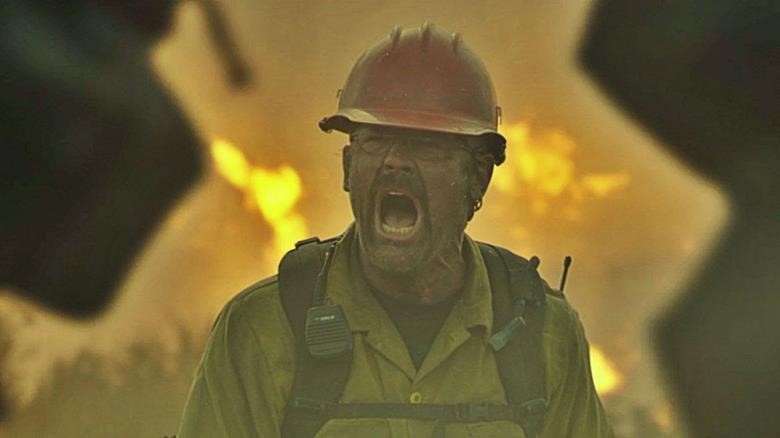
Again out of character, Hollywood critics lavished praise on this traditional film, with the critics of Rotten Tomatoes praising in unison with average viewers the merits of the film. “Only the Brave’s impressive veteran cast and affecting fact-based story add up to a no-frills drama that’s just as stolidly powerful as the real-life heroes it honors.” Another wrote that, “Only the Brave is a visually splendid, spellbinding, and surreal movie that also happens to be an emotionally shattering, over-the-top ugly-cry for the ages.”

* * *
Viewing these films is easy with Amazon streaming rentals, but for the same price you can buy new DVDs if you still have such archaic equipment lying around. Move fast, however, for our post-insurrection respite will likely not last long. In a thousand ways, The System has announced that characters like all the White men in the films just reviewed are now Enemies of the People. In self defense, will real White American men now show the bravery and determination seen in the noble acts of participants in these movies, as well as the real men they were based on? Time will tell.
https://www.